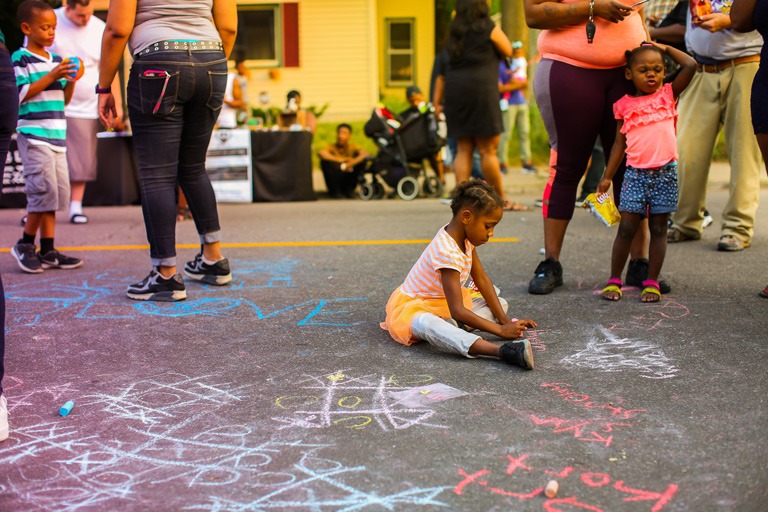Minnesota Harvest Initiative

Photo credit: Katherine Louise Harris of The Jadeite Shutter
“We were looking for a partner who was in alignment with our mission, as well as to spend a lot less money on administration so we can focus on the people and the events.”
Reynolds-Anthony Harris, Founder, Minnesota Harvest Initiative
The Minnesota Harvest Initiative envisions best pursuing its impactful, flexible, and in-the-moment service mission without building major nonprofit infrastructure—a model of flexibility that works with bottom-line administrative support through fiscal sponsorship with Propel Nonprofits.
The genesis of the Harvest Initiative came in 2016 after a string of killings by police officers of young African American men. Minneapolis businessman Reynolds-Anthony Harris, with a track record in mission-driven undertakings such as a bike shop doubling as a community meeting center and support hub for youth, a partnership with the University of Minnesota focused on quality of life solutions, and decades of work in the corporate sphere, saw a framework for action.
It Started at the Barbershop
Harris got a call from the proprietor of a barbershop in North Minneapolis where a community meeting was set to take place. “Tons of people showed up,” Harris says. “And out of that came the Minnesota Harvest Initiative.”
From this meeting came a plan promoting educational choice, empowerment, and broader economic participation for the African American community using the community’s resourcefulness and assets to leverage generational change. Today the Initiative includes roughly a dozen members who own businesses or work in corporate leadership.

Educational Freedom
A first Harvest Initiative priority was focusing energy on the legislative process in order to increase scholarships for private schools in Minnesota. Another was a focus on advocating for the rights of parents with school children. Using grassroots communications through word of mouth and social media channels, the Initiative has an ambitious goal of anchoring a network of African American barbershops as centers for community organizing and empowerment with a focus on education.
“For African immigrants, African Americans, and Latinos, we ask, “What is your lived experience trying to navigate the educational system?”” Harris says. “We know it’s not all bad. Rather than focusing on the negative, we want to take a different route: instead of focusing on gaps, let’s focus on excellence.”
Core members of the Initiative are tasked with initiatives for economic participation and development, while others are collating information about interactions with schools and how to leverage parental choice for children focused on academic achievement.
“Educational freedom is about equipping parents to make the best decision for their children within the reality of Minnesota,” adds Harris. “And that reality will shift over time to include other options.”
Harris cites the African American tradition of teaching and sharing in creative ways as part of his personal project of relaying the community’s history of philanthropy, scholarship, and empowerment, a perspective that he seeks to relate to African American young people. “There’s a long and rich story of how we built our own stuff,” says Harris. “There’s a history that’s been erased, and we’ve rediscovered it so we can go forward.”
Staying Nimble, Responsive to Community Feedback
The Harvest Initiative seeks to evolve quickly in response to feedback from the community. Harris stresses that the organization sees itself as a movement unencumbered by brick-and-mortar infrastructure. “Nobody works full-time for Harvest Initiative, not even quarter-time,” he says. “We all have day jobs. People get honorariums and stipends for the work, but we don’t want to have the overhead.”
Harris describes Propel Nonprofits as essentially functioning as the Harvest Initiative’s administration, a full suite of support services that includes accounting, financial management, information and support for grants, and keeping multiple revenue streams diligently targeted to nonprofit efforts.
“We’re not interested in creating a nonprofit,” he says. “Having been a person who sat on a number of nonprofit boards, I know that it’s complicated – by the time you get a new nonprofit up and running, you might have lost two to three to four years. We were looking for a partner who was in alignment with our mission, as well as to spend a lot less money on administration so we can focus on the people and the events.”

With this nimble approach, the Harvest Initiative is generating a model of community leadership that hopes to shine a positive light on African American heritage to empower change from within.
“We want to take a child of color and take them back in history, to build a consciousness of the greatness there,” Harris says. “Because if you don’t know your history, you can’t find your inspiration.”
You can learn more about Minnesota Harvest Initiative on its Facebook page and see Propel Nonprofits’ full Fiscal Sponsorship Case Studies Report here.
Related Services
-
Fiscal Sponsorship
Propel Nonprofits’ fiscal sponsorship program works with dozens of mission-driven organizations, projects, causes, and collaborations to test drive new ideas as you build infrastructure, set goals, develop your business model, and get your big idea off the ground.
-
Strategic Consulting
As a leader, you want to make sure your organization has a shared vision for the future, and the strategy to get there. Propel Nonprofits’ consultants are experienced at providing strategic planning, board development, and other strategic services to organizations
